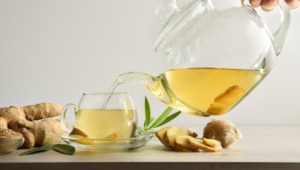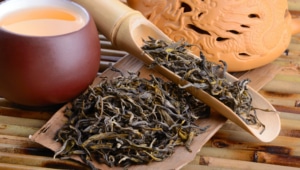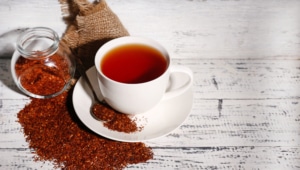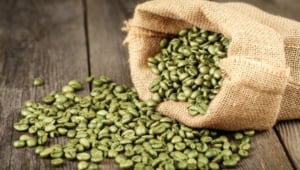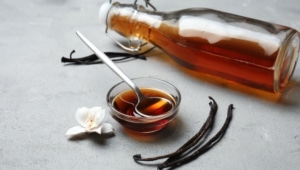5 Health Benefits of Dandelion Tea & 3 Tips
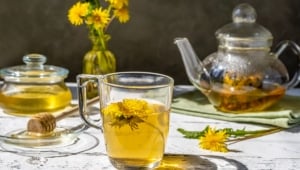
Dandelion tea, also known as dandelion coffee, is an ancient concoction enjoyed for its many health benefits. Find here five important health benefits of dandelion tea, as well as tips for serving and potential risks.
Dandelion tea is great for your digestive system, urinary tract, immune system, and more. You can add dandelion tea to your diet to help manage your weight, combat inflammation, and lower your blood pressure.
Best of all you can use dandelion tea as a delicious substitute for coffee, minus its bitterness and acidity.
If ever you’ve had a lawn overrun with dandelions and wanted to rid yourself of these ‘weeds’, think again: dandelion roots and leaves are nutritious and can be made into a delicious hot beverage. In fact, you can make three different kinds of tea using dandelion plants.
What Dandelion Tea Is: Interesting Facts

What Dandelion Tea Is: Interesting Facts
Dandelion tea is also sometimes known as dandelion coffee, due to it tasting similar to coffee. It’s caffeine free, but may boost your energy levels all the same. The reason it does this is its inulin content.
Dandelions were named after the big African cats because of the shape of the plant’s leaves. The dandelion plant offers more nutrients than most other vegetables you might grow at home.
Dandelion was once said to cure anything from baldness and dandruff to fever and depression. Nowadays, it’s frequently seen as a pesky weed, th

Origin and Where Dandelion Tea Comes From
ough those in the know still use it for many health benefits.
Origin and Where Dandelion Tea Comes From
Some say the usage of dandelion tea was first recorded during the 11th and 12th centuries.
While other sources claim that using the plant for food was first popularized by the ancient Egyptians, Romans, and Greeks.
Traditional Chinese medicine has also been known to make use of dandelions.
In other words, the history of dandelion tea or coffee is a bit murky at best. It’s been enjoyed across the world for many centuries, and is hailed for its multitude of health benefits.
What Dandelion Tea Is Made Of

What Dandelion Tea Is Made Of
Dandelion tea is made from dandelion plant roots, which are roasted and dried before being ground to a powder. This powder is then simmered in water, strained, and enjoyed on its own or with milk and sugar.
You can also use the dandelion’s flowers or leaves to make a simple fresh tea at home.
The root has stronger health properties, but the flower heads taste a little more delicate. Tea or coffee made from dandelion roots can taste much like coffee.
What Dandelion Tea Tastes Like

What Dandelion Tea Tastes Like
This depends on whether you have dandelion tea made from the flowers, leaves, or roots of the plant.
Dandelion tea made from the yellow flower heads can taste sweet and delicate. Dandelion tea or coffee made from the roasted roots will be quite similar to coffee, and have toasted, smoky flavors.
A tea made from the leaves of the dandelion plant will taste herbaceous and earthy with acidic, bitter notes.
Does Dandelion Tea Have Caffeine?

Does Dandelion Tea Have Caffeine?
Dandelion tea is completely free of caffeine. As mentioned above, it does offer a little energy boost due to its inulin content, but without the side effects commonly associated with caffeine.
Nutritional Facts and Calories of Dandelion Tea

Nutritional Facts and Calories of Dandelion Tea
Dandelions are filled with nutrients. They contain vitamins A, B, C, D, E, K, folate, iron, zinc, potassium, and more.
Everything, from the root to the flower, is nutritious and loaded with fiber and antioxidants, including beta-carotene and polyphenols.
Dandelion tea made with just dandelion and no added sugar or milk is very low in calories, making it a diet-friendly beverage.
Health Benefits of Dandelion Tea
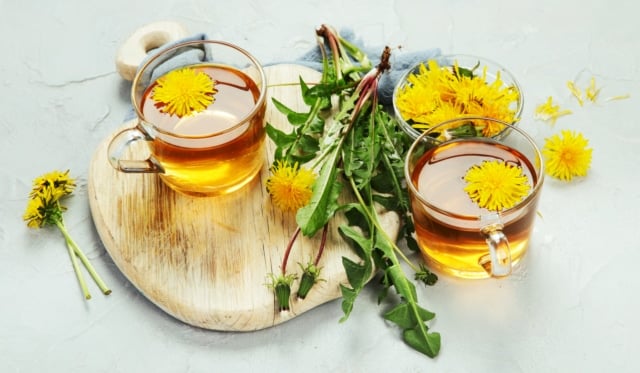
Health Benefits of Dandelion Tea
The dandelion plant offers health benefits from the root to the flowers. Tea made from all parts of the plant has been used to cure all kinds of ailments for hundreds of years.
Below are some of the top health benefits you’ll reap when enjoying dandelion tea as part of a balanced diet.
Inulin in Dandelions May Feed the Beneficial Bacteria in Your Gut

Inulin in Dandelions May Feed the Beneficial Bacteria in Your Gut
Inulin is still a somewhat little understood prebiotic present in dandelions. It’s said to increase your body’s production of melatonin and serotonin.
These in turn help you sleep better, causing less fatigue when you wake up in the morning. This is also what’s important for the energy ‘boost’ dandelion tea may give you.
It’s not the kind of energy-giving hammer blow that is a strong coffee, but rather a gentle means to help you feel more alert and balanced. What’s more, inulin may help with weight loss, too.
A Traditional Cure for Liver Problems

A Traditional Cure for Liver Problems
Some studies have shown that dandelion root tea can help increase bile flow. This may help your liver to detoxify, as well as relieving some of the symptoms of liver diseases.
Dandelion tea also has a diuretic effect, meaning it can help your liver eliminate toxins more rapidly and efficiently.
Strengthens Your Immune System

Strengthens Your Immune System
Dandelion tea contains plenty of vitamin C. This is one of the main reasons why it’s so good for your immune system, and will help it function properly.
This is particularly helpful during the colder months of the year. Polyphenols in dandelion tea also help with immunity to bugs.
Soothes Your Digestive System

Soothes Your Digestive System
Dandelion has shown to be a helpful aid for your digestive system. Tea made from this incredible plant helps maintain the bile in your body to flow normally.
Vitamin C in dandelion is also helpful at increasing the absorption of minerals.
Dandelion tea helps prevent constipation by stimulating your digestive system, while also allowing your body to absorb more nutrients.
Helps Relieve Symptoms of Heartburn

Helps Relieve Symptoms of Heartburn
Because dandelion tea is so good at helping your digestive system, it’s also excellent at relieving heartburn symptoms.
Dandelion helps your digestion to move along steadily, so it won’t sit in your stomach for long periods of time.
This means your body will produce less stomach acid, and therefore you’re less likely to experience reflux or heartburn.
Potential Risks

Potential Risks
As with any herbal remedy, dandelion tea also comes with some potential health risks. Most of these are associated with overconsumption or allergies.
If you’re not allergic and have a normal amount of dandelion tea, you’re unlikely to experience any side effects.
Do bear in mind that, per our section below, dandelion tea isn’t suitable if you’re pregnant.
Too Much Dandelion Tea May Cause Heartburn

Too Much Dandelion Tea May Cause Heartburn
It sounds counterintuitive, but too much dandelion tea can have too much of an effect on your digestive system. In this instance, it might cause an increase in stomach acid in your body. This may then result in heartburn or reflux.
Not Recommended for Pregnant Women

Not Recommended for Pregnant Women
Dandelion tea offers plenty of excellent health benefits, but does contain a lot of vitamin A.
In adults who aren’t pregnant, vitamin A will help your body fight off illnesses and infections, improve your night vision, and keep your skin healthy.
In pregnant women, too much vitamin A can cause severe birth defects in the unborn baby.
May Cause Side Effects in People with Kidney Troubles

May Cause Side Effects in People with Kidney Troubles
Experts appear to be divided on the effects of dandelion tea on people with kidney problems. Dandelion tea can act as a diuretic, increasing how much urine your body makes and flushing out toxins.
This could be helpful for those with kidney problems, as too much retained fluid causes issues. The vitamin A content could be the bigger problem.
Too much build up of vitamins A, E, and K in your body can become particularly problematic.
Could Cause Allergic Reactions
If you’re allergic to similar flowers such as daisies, chrysanthemums, marigolds, or ragweed, there’s a strong chance you’ll also be allergic to dandelions. In this instance, you may wish to avoid drinking dandelion tea.
Types of Dandelion Tea

Types of Dandelion Tea
There are three main types of dandelion tea, made from different parts of the plant. You can make any of these to get some of the health benefits mentioned above. It just depends on what taste you like best.
Dandelion Flower Tea

Dandelion Flower Tea
Dandelion flower tea is the sweetest, most mellow tea you can make from these little yellow flowers. To make it, use dried or fresh dandelion flowers. Steeped, dandelion flowers will give you a lovely yellow, fragrant tea.
Dandelion Leaf Tea

Dandelion Leaf Tea
Dandelion leaf tea is more bitter and slightly acidic than the other types of dandelion tea. If you’re making this tea with fresh leaves from your garden, make sure you use young leaves and wash them well before use.
Roasted Dandelion Root Tea
Dandelion root tea is also sometimes called dandelion coffee. It’s made from toasted, dried dandelion root, and results in a smoky, toasty, coffee-like drink.
Is Dandelion Tea in Pregnancy Good For You?

Is Dandelion Tea in Pregnancy Good For You?
There aren’t any studies to verify the safety of dandelion tea in pregnancy. Simply put, there isn’t enough information available on whether or not dandelion tea is fine to consume in pregnancy.
However the plant’s very high vitamin A content — particularly in the roots — should make you wish to avoid adding dandelion tea to your pregnancy diet.
Too much vitamin A may cause severe abnormal fetal development including spina bifida, eye problems, cleft palate, ear deformities, and more.
This means that the large vitamin A content of dandelion tea could make it quite unsafe for your unborn baby. You’re therefore best off steering clear of dandelion-based beverages in pregnancy.
Instead, opt for something like rooibos tea or a small amount of regular black tea to help give your body antioxidants and ward off pregnancy nausea.
Note: dandelion tea is probably safe for use when breastfeeding. It can cause allergic reactions in some, and might upset your digestive system if you have too much. However it’s unlikely to harm your baby if you’re breastfeeding.
Simple Guide for Making the Perfect Dandelion Tea

Simple Guide for Making the Perfect Dandelion Tea
Making the perfect dandelion tea starts with your preference of what to use: for a sweeter, more delicate tea, use fresh yellow flower heads.
For an astringent, herbal tea, use the leaves. For a coffee-like toasty, warming beverage, go with roasted and dried roots ground to a powder.
We’ll use the latter here, for the vast benefits dandelion roots offer paired with the delicious smoky flavors.
Ingredients:
- 2 tbsps of ground toasted dandelion root
- Water
And here’s how you do it:
- Start by boiling 8 fl oz of water, then lower the heat to a simmer.
- Stir in the ground dandelion root and steep for at least 3 minutes. Remove your pot from the heat. Next, let it sit for 30 minutes.
- Strain the tea into your favorite mug and add honey, sugar, and/or milk to taste. Enjoy.
Tips for Drinking and Serving Dandelion Tea

Tips for Drinking and Serving Dandelion Tea
Dandelion tea — whether made from the flowers, leaves, or roots — is delicious on its own and offers tons of unique flavors. If you’d like to experiment with dandelion tea recipes, here are a few other varieties you may enjoy.
Combine Dandelion with Ginger and Lemon

Combine Dandelion with Ginger and Lemon
Dandelion tea is already good for detoxing your body — it’s even better paired with ginger and lemon. Ginger is also prized for its properties as a digestive aid, as is lemon.
Lemon juice is particularly useful for flushing out your liver. To top it off, mixing the three and adding a bit of honey makes for a delicious drink.
Add Some Honey for Sweetness and Additional Health Benefits

Add Some Honey for Sweetness and Additional Health Benefits
Honey is well-known for boasting a variety of health benefits. It’s great for fighting inflammation, a variety of illnesses, boosting your nervous and heart health, and more.
Adding it to dandelion tea not only makes for an even better health drink, but also sweetens it nicely.
It’s great for enhancing the floral flavors of a tea made from the yellow flowers, and decreasing the bitterness of dandelion leaf tea.
Make a Dandelion Root Latte with Cinnamon

Make a Dandelion Root Latte with Cinnamon
One of the best dandelion root latte recipes we found mixed dandelion ‘coffee’ with cashew butter, maple syrup, vanilla extract, and cinnamon.
This makes for a creamy vegan coffee alternative, minus the caffeine. If you don’t like or have cashew butter on hand, try substituting this with almond or oat milk.
Enjoy Some Fried Dandelion Greens and Flowers

Enjoy Some Fried Dandelion Greens and Flowers
Did you know that you can fry dandelion greens and even coat the leaves and flowers in tempura batter?
Fried greens taste a little like spinach, while battered leaves and flowers make for a crunchy, unusual treat. Use young leaves and flowers directly from your own backyard, just make sure you wash them first.
- Cinnamon Tea. Health Benefits and Tips.
- Oreo Cookie Flavors. Best and Weirdest Flavors.
- Starbucks Refresher. Tips and Best Drinks.
- Jelly Belly Flavors. Best and Grossest.
- Boba Flavors. Best Flavors and Types.
- Pop Tart Flavors. Tasty Alternatives and Best Flavors.
